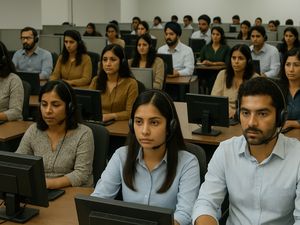

In recent days, the technology industry has been electrified by news of an unusual scandal that has come to light at one of the major international corporations. It turned out that a group of remote workers from India were extensively using artificial intelligence tools to perform their duties often without the knowledge or consent of their employers. Instead of writing code, creating documentation, or preparing analyses themselves, they allowed advanced language models and generative AI to do the work for them. The scandal has sparked a lively debate about the ethics of work in the age of automation, the future of employment, and where the line should be drawn between smart use of technology and outright deception.
In recent weeks, industry media around the world have been abuzz with reports of a scandal that has highlighted new challenges in the era of artificial intelligence. At a major US technology company, it was discovered that a group of remote workers from India had been extensively using generative AI to complete their tasks — in direct violation of the company’s internal policies.
The issue was uncovered by chance during a source code audit and an analysis of work patterns. Experts noticed that certain sections of code were almost identical to those generated by popular AI models such as GitHub Copilot and ChatGPT. System logs further revealed that the employees were using AI tools almost around the clock, producing complete solutions in just minutes.
It soon became clear that this was no isolated incident. At least a dozen employees were involved in the practice, not only automating their daily tasks but, in some cases, simultaneously taking on assignments from multiple companies. For them, AI had effectively become a “stand-in employee”, completing high-quality work in a fraction of the time and effort.
Once the matter came to light, the company’s management promptly suspended the contracts of several employees and launched a comprehensive internal investigation. It was emphasised that the issue was not with the use of AI tools per se — many tech firms actively encourage such usage — but with the lack of transparency and the deliberate concealment of the true source of the work.
The scandal has sparked widespread debate within the HR and IT sectors. Experts stress that this is not an isolated issue. Increasing numbers of professionals around the world are beginning to rely on AI — sometimes crossing ethical boundaries and violating contractual obligations in the process. The question now arises as to whether working models and performance evaluation systems need to be fundamentally rethought in the age of generative tools.
Some commentators argue that companies themselves contribute to this situation. On the one hand, they demand ever-increasing productivity and faster results; on the other, they do not always provide adequate training or clear guidelines on the appropriate use of AI in the workplace.
Others suggest that this entire episode simply highlights the inevitable shift in working models. “Artificial intelligence is becoming an inseparable partner to the employee. Rather than banning its use, we must learn to manage it and integrate it transparently into professional processes,” says Professor Ramesh Kumar of Bangalore University.
The scandal involving the Indian workers is likely just the beginning of similar cases that will become increasingly common. In this era of rapid AI development, companies will need not only to update their policies, but also to reflect on what truly constitutes “honest work” today.
The consequences of this case are likely to resonate far beyond the company involved. Organisations across the globe are now reassessing their internal policies on the use of AI and reviewing their security and audit procedures. Legal experts warn that the line between acceptable use of automation and breach of contract remains blurry in many jurisdictions. Meanwhile, HR departments are facing a new challenge: how to fairly assess employee performance in an environment where AI can dramatically alter output quality and speed.
For employees, this incident serves as a cautionary tale about the risks of using AI tools without transparency. Companies are expected to tighten compliance rules, implement clearer disclosure requirements, and invest in training that helps staff understand where ethical boundaries lie. On a broader level, the story highlights the urgent need for updated labour laws and workplace norms that reflect the realities of AI-assisted work.
If managed well, AI can become a valuable enabler of productivity and innovation. If left unchecked, it may erode trust between employers and employees and create new forms of digital misconduct. The coming months will show whether the industry can strike the right balance between embracing the benefits of AI and safeguarding the integrity of human work.




